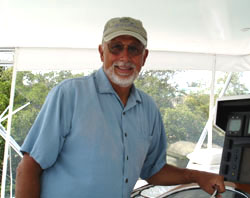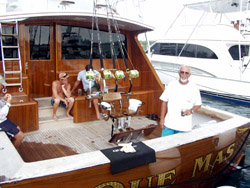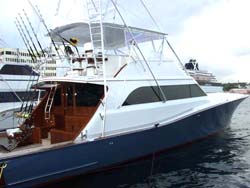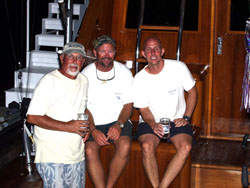 Sport fishing is a family affair for Wally Whitley. "As a kid, growing up in San Antonio, Texas, my dad used to take me over to the coast where we'd fish for red fish and trout in a little 18-foot runabout."
Sport fishing is a family affair for Wally Whitley. "As a kid, growing up in San Antonio, Texas, my dad used to take me over to the coast where we'd fish for red fish and trout in a little 18-foot runabout."
The story repeated itself a generation later in the early 1970's. "I moved to Fort Lauderdale, Florida, with my wife and two sons, Jim and Mark. They were pre-teens and we'd head offshore together on an 18-foot Wellcraft with friends to fish for dolphin."
Whitley added, "I always felt that fishing kept my sons and I together. Even today, I can twist their arms into four or five trips a year and we often bring the grandkids. My 11-year-old granddaughter and 9-year-old grandson have caught sailfish and other species. The kids fished with us in Costa Rica last year. They also fish regularly from our dock. We live right on the bay in Islamorada."
Just as Whitley's sons have grown up fishing, so has Whitley graduated to equally bigger and better sports fishing yachts. "After the Wellcraft, I got a 23-foot center consol that we could take over to the Bahamas. Then in 1992, I got a 54-foot Donzi. My latest boat is a 70-footer built by American Custom Yachts. It took us, my captain Travis Butters and I, three years to build to have it just the way we wanted it. The idea was a yacht that we could use for extended cruising and fishing trips. We took delivery of it in November 2004."
 Named Que Mas, Whitley's yacht boasts some outstanding features.
Named Que Mas, Whitley's yacht boasts some outstanding features.
"I spend a lot of time in the cockpit while fishing, so that's an area we looked to customize," he said.
The massive cockpit features bi-level storage cabinets forward in order to leave more room for fishing. This arrangement also makes for a lot of rear facing seating so that anglers and guests can easily watch the baits. The cockpit also features bridge overhang lights that pull down and become air-conditioning vents for trolling on hot days.
Also, he says, "We have an 18-foot Hells Bay skiff that we like to take out bone fishing. I didn't want to see ugly davits up on the bow, so we had an engineer install retractable davits that allow the skiff to disappear into a storage space in the foredeck, and hydraulically pop back to lift the skiff back up on deck for launching."
Yet a third interesting feature lies in the bow as well. The boat has no bow rail or bow pulpit, which would seem to make anchoring a problem. But, engineers found an ingenious way to create a folding pulpit that disappears below a deck hatch when not in use. It simply folds up into the anchor locker.
Whitley has made some impressive sailfish catches during his sports fishing career. "We fish five or six sail fish tournaments a year," he says. "We won the Florida Keys Gold Cup Sailfish Championship in 2005. This year, we fished the World Sailfish Tournament in Key West and finished 7th out of 110 boats. We were 5th on the second day and had a shot at the top, but it didn't work out that way. We've also had some outstanding catches in Costa Rica - 33 and 38 in a single day."
He adds, "We've had good luck with sailfish. Now we want to see what we can do on the marlin side, especially with the long range boat we now have."
 Marlin are Whitley's favorite fish. "I like to fish for marlin with 50-pound test and pitch baits. That's most exciting," he says. "Its incredible. It's a huge challenge to get the teaser right in the fish's face and get them to come and eat the bait. The drop back takes a lot of skill. And, the hook-up is pretty spectacular. Right behind the boat."
Marlin are Whitley's favorite fish. "I like to fish for marlin with 50-pound test and pitch baits. That's most exciting," he says. "Its incredible. It's a huge challenge to get the teaser right in the fish's face and get them to come and eat the bait. The drop back takes a lot of skill. And, the hook-up is pretty spectacular. Right behind the boat."
One of Whitley's best fish stories centers on marlin fishing. "With the new boat last year, we left in January and headed to Panama for some fishing. In Pinas Bay, we decided to go out to catch bonito on 30-pound spinning rods. The idea was to use the bonito as bait on 50 - to 80-pound test rods to fish for blue or black marlin. Well, I caught a bonito and immediately after that a big black marlin shows up off the right rigger and ate the bonito. We estimated the fish at 800 to 900 pounds, so we knew we couldn't catch it on 30, but we wanted it to stay on as long as possible. I did manage to keep the fish on for about 10 minutes before it spit out the bonito. We had the whole thing on video."
Interestingly, Whitley adds, "Later that week, we heard that one of the Tropic Star boats hooked up an estimated 1100-pounder. Guy Harvey was there and got it on video. I have to ask him to see the video sometime, but we think that grander could have been the fish we hooked."
Retired from a career owning and operating a credit card processing company, and today a partner in a venture capital firm along with his two sons, Whitley says he doesn't let work get in the way of fishing. "We'll head back to the Pacific for billfishing in 2007, but I guess I'll spend about 80 to 90 days fishing in the Atlantic this year."
He continues, "We'll fish four tournaments in Bermuda, then the Bahamas tournaments like the Custom Boat Shoot-Out, and then down to St. Thomas for the Boy Scout Tournament (USVI Open/Atlantic Blue Marlin Tournament). "The Boy Scout Tournament is one of my favorites," Whitley says, "because I like to fish against the best - the best anglers, best captains and best boats. I also like that no fish are killed."
 This year, Whitley will enter Que Mas in the Bermuda Triangle Series. The Series kicks off with the Harbour Island Open, June 8-10; moves on to the Bermuda Open, July 7-9; and concludes with the USVI Open/ABMT, August 6-10.
This year, Whitley will enter Que Mas in the Bermuda Triangle Series. The Series kicks off with the Harbour Island Open, June 8-10; moves on to the Bermuda Open, July 7-9; and concludes with the USVI Open/ABMT, August 6-10.
He says, "In 2004 we read about the Series and knew that we were building a boat that could travel to Bermuda. Also, there are four tournaments in Bermuda in one month, if you count the Round the World Tournament on the Fourth of July. And, we heard other captains and anglers had been to Bermuda and enjoyed it, so we thought we'd give it a shot."
In the future, Whitley says, "I think Bermuda and the Bahamas need to have more release tournaments and to use circle hooks. The big fish are the females, and by killing them, we deplete the stock."
He continues, "The technology is there for American-based boats to travel extensively and explore new fisheries. With shipping methods like Dockwise Transport, you don't need a mothership. Next year, for example, we're looking at going to Vancouver from Cabo San Lucas. We'd also like to head over to the Galapagos."
